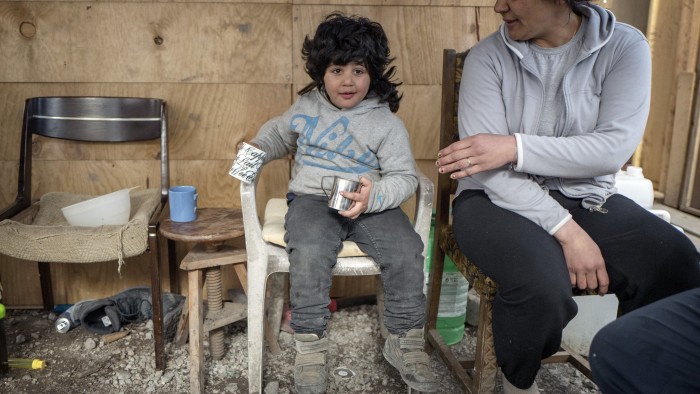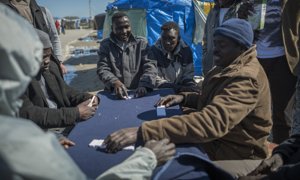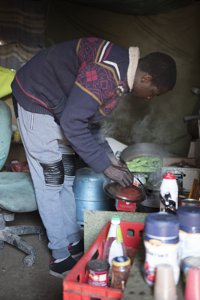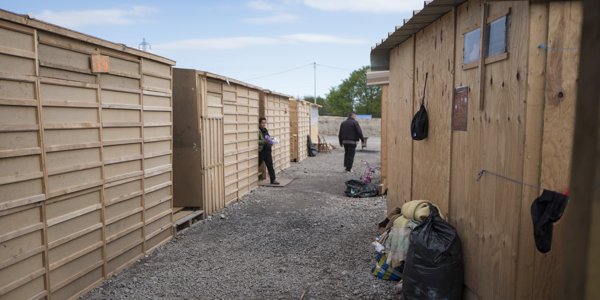Migrant camp measles outbreaks spark fears of health crisis

Simply sign up to the European companies myFT Digest -- delivered directly to your inbox.
The sun is falling over the Grande-Synthe migrant and refugee camp in a suburb of Dunkirk in northern France. Omar, Noroz and their three young children are warming themselves around a fire they have made using wood from a broken pallet.
The couple (neither of whom would reveal their full names) fled the Kurdish part of Iraq last September to escape violence. They hope to start a new life in the UK, but tightened security at French ports has made the crossing all but impossible for a family of five. The prospect of a long stay in the camp has turned their attention to a more immediate problem: their health.
“My children are getting colds and sometimes have fevers,” says Noroz, who has the same thick, jet-black hair as her son. She is worried about potential epidemics, and says her children have never been vaccinated. “The longer we stay here, the more we are at risk from disease.”
In the space of one month late last year, the migrant population camping in Grande-Synthe swelled from about 200 to roughly 2,000 as mainly Kurdish families arrived in the area, desperate to find a way to cross the English Channel. The sudden influx prompted local authorities to call on the medical charity Médecins Sans Frontières to help head off what looked likely to become a public-health crisis, given the unhygienic conditions.
“Displaced people living in bad conditions are at much greater risk,” says Michel Janssens, head of mission at MSF. “Airborne contamination is a huge risk, and children and women are particularly vulnerable.”
In January, the organisation started building a formal camp, which today sits between a railway and a motorway — some of it on land that MSF rents from a private owner.
Noroz’s fear of an epidemic echoes growing concerns of local authorities and aid organisations in France and across Europe. At the end of last year, the World Health Organisation, along with Unicef and the UN High Commissioner for Refugees, released a statement calling for national campaigns to vaccinate refugees and migrants entering Europe. Many new arrivals come from countries that still harbour diseases which have been eradicated in Europe.
“The current influx of refugees, asylum-seekers and migrants is unprecedented not only in scale but also in speed of movement. This poses particular challenges in deciding when and where to vaccinate,” the joint statement said.

Just along the coast in Calais, at the large camp that has become known as “the jungle” — home to an estimated 5,000 migrants from at least 10 different countries — the health concerns are immediately evident. The state’s recent decision to clear the southern portion of the camp has forced many inhabitants to move to the northern area, intensifying the overcrowding and placing more strain on the limited infrastructure available, according to aid worker Olivier Marteau, the MSF co-ordinator in Calais.
Marteau says that there have been three known cases of Hepatitis A in the camp this month — a fact he attributes, in part, to the deteriorating hygiene following the clearances. Worse still, several cases of measles — a highly infectious viral infection — were detected in January. Another suspected measles case was detected in the Grande-Synthe camp.
While measles is much less serious in effect than the Ebola virus, it is far more contagious, with a single infected person likely to pass it on to as many as 30 others. “You have to react very quickly,” says Dr Janssens.
In co-ordination with the French health authorities and other aid groups, MSF helped carry out two mass vaccination programmes in February that covered some 2,000 migrants in the Calais camp and more than 500 at Grande-Synthe. They also vaccinated about 250 children aged under six — 200 in Grande-Synthe and 50 in Calais — against tuberculosis, polio, tetanus, and gave them the triple MMR vaccine.
One of the challenges was ensuring that vaccines remained cold in the field, a problem the French state has little experience with, given that national vaccine programmes are carried out in clinics or hospitals, says Dr Janssens. “We used cold boxes, which we use all the time in other countries but that are normally not used in France,” he says.
Another problem was persuading migrants to register themselves so that each person’s vaccination history could be recorded, says Marlene Malfait, medical team leader for MSF’s mission in Calais.
“They always think that every time they give their name it is something that can be used against them,” says Dr Malfait. “So you have to explain and explain that we don’t care what name is on the paper as long as they get the vaccination.”

Adam, for one, is feeling the strain. The 19-year-old from the Darfur region of Sudan, who did not want to reveal his full name, has spent the past eight months living in a shelter made from black polythene stretched over branches that he found nearby.
He made a door from wood that one of the many aid groups donated, but there is no lock, and he says that his few possessions, as well as food supplies, are a constant target for thieves.
Meanwhile, he wants vaccinations to guard against the likes of measles and tetanus, but says he has so far been unable to get them. “It does not matter what you are suffering from,” he says. “The only thing they give you is paracetamol.”
Some vaccines are in higher demand than others. As young males make up most of the Calais camp’s population, there is an overwhelming demand for tetanus injections because of the commonplace cuts and grazes that many suffer trying to climb barbed wire fences.

Some of the risks have more to do with the lack of fresh water available for taking showers and washing clothes. Earlier this year, scabies broke out in the Calais camp, causing residents intense discomfort and posing an additional puzzle for aid workers.
“There are pills to combat scabies, but you also have to wash for three days until the parasites die,” says Dr Janssens. “We treated [people] with powder, but we didn’t have the capacity to shower 5,000 people all at once.”
For now, health workers foresee some respite, given the end of winter and the diminishing threat of influenza and other respiratory illnesses. But with new migrants and refugees arriving, and the near certainty that they will have to endure another winter in the camps, there are few doubts about what the future holds: at Grande-Synthe, health workers are already preparing for another vaccination campaign next month.
Comments